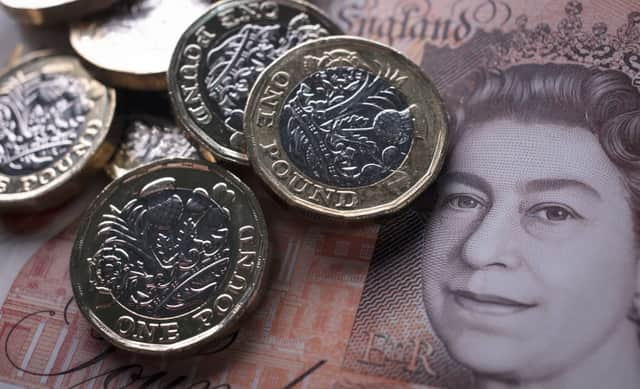The National Minimum Wage is changing from April 1 - how it will impact you


The National Minimum Wage will rise from April adding an extra 82p to hourly pay with ministers claiming the pay increase will amount to £1,000 more a year for the average worker.
The rise comes amid a cost of living crisis that could leave workers paying 7% more for goods from next month.
Advertisement
Hide AdAdvertisement
Hide AdHowever, it has been questioned whether the increase will be enough to ease the pressure of soaring inflation.
Here’s everything you need to know about the National Minimum Wage rise from who it affects to how much pay will go up by.
What are the new hourly rates?
From 1 April, the hourly rate for people aged 21-22 will rise to £9.18 an hour, up from £8.36.
National Living Wage for over-23s would increase to £9.50.
The apprentice rate will also rise, up from £4.81 an hour to £4.30.
Advertisement
Hide AdAdvertisement
Hide AdThis is despite Tory ministers previously claiming that hey would raise the minimum wage to £10.50 an hour and expand the eligibility to over-21s by 2024.
Ministers pledged future rises would be pegged to two-thirds of median earnings - higher than the previous 60% target.
Who will qualify?
National Living Wage - Apprentices: £4.81 an hour
16-17 year-olds: £4.81 an hour
18-20 year-olds: £6.83 an hour
21-22 year-olds: £9.18 an hour
23 and over: £9.50 an hour
How have wages been affected by inflation?
Recent labour market data shows how wage rises are struggling to keep up with spiralling inflation.
Office for National Statistics (ONS) data shows wage growth in the UK is already far behind rising prices.
Advertisement
Hide AdAdvertisement
Hide AdBetween October and December 2021, average weekly pay across Britain fell by -1.2%.
When adjusted for inflation, regular pay fell on the year at -0.8%.
The data shows how wages are struggling to keep up with the rising cost of living.
Inflation is expected to increase above 7% this year with the Bank of England warning that this is going to hit workers.
Advertisement
Hide AdAdvertisement
Hide Ad"These figures confirm working people still face a fragile recovery in the face of a growing cost of living crisis and spiralling inflation," said Pat McFadden MP, Labour’s shadow chief secretary to the Treasury, in response to the data.
What has been said about the National Minimum Wage rise?
Labour has criticised the government’s plan, stating that their own minimum wage policies are far better.
Shadow Treasury Secretary Bridget Phillipson said: “This underwhelming offer works out at £1,000 a year less than Labour’s existing plans for a minimum wage of at least £10 per hour for people working full-time.
"Much of it will be swallowed up by the Government’s tax rises, universal credit cuts and failure to get a grip on energy bills.”
Advertisement
Hide AdAdvertisement
Hide AdGraham Griffiths, director of the Living Wage Foundation, said there was still a "substantial gap" with the real Living Wage.
He said: “The past 18 months has been a perfect storm for workers and families, with costs like fuel and energy rising and cuts to household incomes, so it’s positive to see a significant increase in the minimum wage.
"However, the real Living Wage, unlike the government minimum, is calculated annually based on covering living costs.”
He added: "Next month, as part of Living Wage Week, new Living Wage rates will be announced that reflect the rising living costs we’ve all been experiencing.
Advertisement
Hide AdAdvertisement
Hide Ad"These rates will see a substantial gap remain between the real Living Wage and the new government minimum wage.”
"If we’re to recover and rebuild over the coming months and years, we’ll need to see more employers commit to go beyond this new government minimum, do the right thing, and commit to pay a real Living Wage," he said.
What is the cost of living crisis?
Britain’s cost of living crisis has seen a surge in prices including higher household bills as well as rising petrol, energy, and food costs.
These prices are set to get worse this spring following Ofgem’s announcement that it is increasing the energy price cap.
Advertisement
Hide AdAdvertisement
Hide AdThis will add around £700 on average to annual gas and electricity charges for millions of customers.
Matthew Percival, director for people and skills at the Confederation of British Industry (CBI), said: "The good news is that the UK economy is continuing to create jobs.
"The bad news is that businesses are struggling to hire and pay is failing to keep up with inflation."
"Bold action is needed to go for growth, with steps to address skills and labour shortages," he added.
How has the Bank of England responded?
Advertisement
Hide AdAdvertisement
Hide AdThe Bank has tried to combat accelerating price growth by increasing interest rates to 0.5%.
But if employees ask for big wage increases to match the cost of living, its task could be made much more difficult.
Last week, the Bank of England governor Andrew Bailey was criticised after suggesting that employers should think twice about giving their staff pay rises.
According to the ONS most recent figures, job vacancies hit a new record high of 1.3 million while unemployment fell to 4.1% - only slightly above pre-pandemic levels.
A version of this article originally appeared on NationalWorld.com